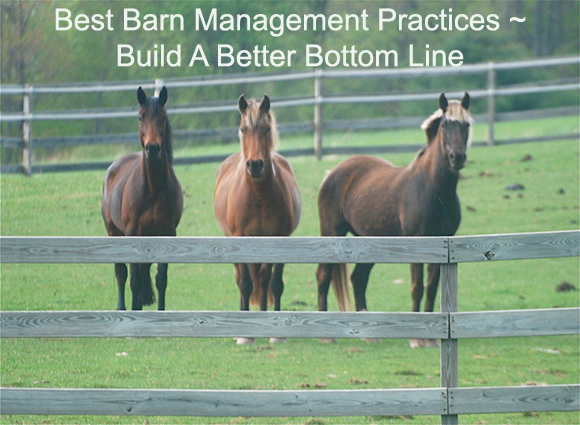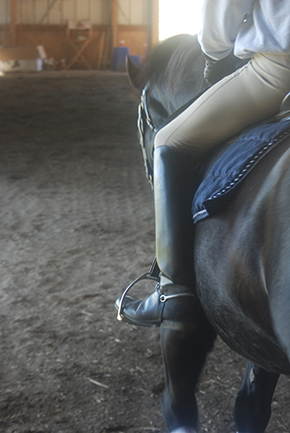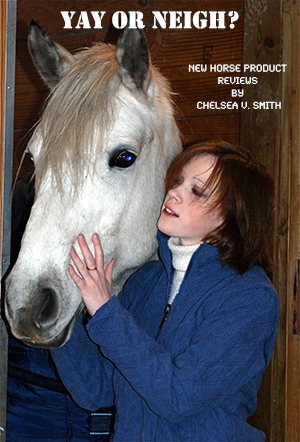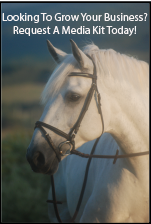Best Barn Management Practices ~ Build A Better Bottom Line
By Nikki Alvin-Smith

When you operate a horse farm the first thing that probably comes to mind is boosting your income. The two way street of basic accounting, means that the other side of making money is saving on expenses. Things change. What might have been a great deal or price on something two years ago may now be an expensive option that you don’t even realize because you have not kept up with the changing times.
In any event, if you take a good hard look at least once a year at exactly where your hard earned dollars are going then you are on the right track.
Success stems from always being on point with everything you do. If you are training a horse and he is off color you know right away that you need to look at his temperature, respiration, soundness and analyze what is wrong. If you applied the same practice to your business you would be cantering in the right direction to profitability. Busy horse owners often prefer spending time with horses rather than tackling mathematics or accounting, but it is important to take the time to evaluate where hard earned dollars are going and always seek to improve profits. Let’s take a look at some key areas where you can possibly improve that bottom line.
Labor
If you are paying for help around the barn look at bartering services where you can to save money. However, if you offer a board discount or free board to someone in exchange for barn work do the math and make sure that you are truly saving money. A boarder with free access to bedding, hay and supplies, or someone that rides every evening using the indoor lights on full for an hour a day because they are at your barn after hours, may end up being more expensive than a paid employee.
Insurance
Insurance should always be shopped around every year. Markets change, underwriters change and so does the law. The loss experiences of an underwriter in any given year will directly affect the next year’s premiums for everyone. Why accept these increases, which  may seem minimal but may indeed add up over time? When you see any increase always call your agent and see if it can be minimized in any way.
may seem minimal but may indeed add up over time? When you see any increase always call your agent and see if it can be minimized in any way.
Minimize your exposure by providing waivers, good signage about expected behavior and certainly about barn rules e.g. Hardhats must be worn at all times. Follow as many safety practices as you can with your barn. Monitor riders, address security of the tack room and other high value/high risk areas with cameras and require absolutely everyone that comes on the property to sign a solid waiver that is hopefully drawn up by an experienced equine attorney.
Always follow good safety practices to avoid damage to equipment, buildings, people and horses. A great safety record can save you money on premium prices. Follow smart safety practices for fire by cleaning down cobwebs, use commercial grade fans in summer, have electric circuits in conduit to prevent rodents chewing through wires etc.
If your business has changed significantly always check your insurance policy to ascertain that you have the coverage you need but nothing more. For example, if you used to own 30 lesson horses and now have only 20, your policy should reflect the downsizing with a lesser premium.
Supplies
One of the biggest budget items when you operate a horse barn full of beautiful equines is hay. If you provide high quality hay your horses will waste less with the added bonus you will have less hay to handle. Quality versus quantity is very important in saving expensive vet bills due to colic, extra labor to clean up spoilt hay and better health of your horses therefore requiring less supplements. For example, a big round bale may seem cheaper overall, but when you take in to consideration the wastage, the need for special containers and equipment to move it around, it may not prove the most economical choice.
Correct storage of hay in addition to having plenty of storage space also affects the bottom line. You can save money if you buy well-cured hay off the wagons at time of harvest at a discount price. Store it correctly so there is no spoilage or wastage.
If you keep your supplies stocked up you won’t be chasing around for hay later and possibly need to pay higher prices if there is a market shortage.
With bedding supplies buy in bulk as this will also save money. Tractor-trailer loads can be brought in and split between your barn and your neighboring horse owners if you cannot stock it all or afford the whole trailer load of bedding. You can even make a profit by charging a bit extra per bag to other buyers as a fee for organizing and receiving the trailer on your property to offset your own bedding costs. This is an awesome idea as the neighbors can also come in and help unload and provide some free labor.
Every year there are many new products that hit the bedding market so check out all the options and add mats to the stalls to save on both labor time and also money on the amount of bedding that is used. Regular mucking out will also save you money on bedding in the long run.
For supplements, tack and equipment remember that good tools make a job faster and more effective. Take your grooming kit for example, old tired brushes will make your work harder and the results less spectacular. Find the right brushes for the job in the right sizes to fit your hand so that you are not wasting any time and effort. The same goes for all equipment; muck forks with tines missing waste time, tractors that aren’t well maintained gobble up more diesel.
Buy used tack and equipment where it makes sense especially if the equipment will be slightly abused by other users. Saddles can be picked up very cheaply second hand, as can tall boots, horse boots and any equipment you might possibly need. Keep all your leather goods clean and well maintained. Clean tack is not just a safety issue. When you clean equipment it gives you a chance to check for loose stitching or cracked leather that might break under the stress of riding but this effort will also ensure your tack lasts longer.
When you buy anything, from supplements to a new tractor, always shop around and be certain to get a Sales Tax Exempt certificate if you are a qualified horse business and use it for all your purchases including your own riding attire and personal equipment that you need to do your job. The costs for these items can also be deducted from your end of year taxable income in some instances. Consult an accountant for best advice.
Accounting Smarts
Consult a professional accountant that has experience in farming and/or equine business to ensure you are depreciating everything you can from the new well for the barn to the cost of new fencing or a piece of farm equipment. In the long run smart accounting. For example: Accrual method versus cash method, may save you taxes if operated professionally.
Utilities
Another large bill can be the electric bill for those costly lights especially if your facility is of older construction. Contact your local electric company and ask for an in person audit to see where you can save energy. Many energy companies will offer grants toward the purchase price of new energy efficient lighting or even replace old energy wasting lights in an indoor for free. It always pays to ask.
Consider insulation for all areas you need to heat in the buildings such as the tack room or office and add automatic door closing devices to the doors so they shut themselves. This will not only keep heat in but it will keep pesky rodents out.
Roof insulation and wall insulation costs may also be eligible to be deducted on taxes. Work you do now will save you money in the long run.
For your fuel needs such as diesel, the installation of a large tank and an annual contract with an oil company that provides a cap fee on the price per gallon can save you money over the year.
Fencing and Buildings
Keep fencing and buildings well maintained. It is cheaper to have a routine maintenance program for both these items as well as all equipment so that you are not stressed over costly breakdowns or damages. Horses that escape can cause expensive vet bills due to poorly maintained fences, equipment will only break down just when you need it most such as in a snowstorm. A leaky roof will cause major long-term damage to any structure. Fix it now or pay more later. Clean windows improve natural light and that equals less time spent with the lights on.
If you have space to add more fencing to provide additional pasture for your horses it is well worth the investment. Horses do very well turned out and when they are grazing grass they are not using bedding or noshing down on hay or requiring as much labor to take care of them.
Vet Bills
Spring vaccinations and check ups for your herd can be expensive. See if your vet offers Spring Clinics where they discount rates on teeth floating/vaccinations and farm call fees when they do a round robin call day in your area.
Ask. Ask. Ask.
Ask industry colleagues for recommendations for vendors for all your needs. When you network with other horse owners you can gain much information about the best sources for products, the best deals and garner much useful knowledge from their input.
Keep Accurate Business Records
While you may prefer to be outside working with horses rather than inside with a computer screen for company, it is necessary to keep accurate business records. Not just because the government requires them, but because when you utilize an accounting program and carefully upload all your checks written, reconcile bank statements and record cash payments you will have a quick and easy expense report at your fingertips. Always require and keep a receipt for every purchase. Accounting programs even have an option for you to put an item under ‘ask my accountant’ so you can simply send your end of year accounts directly to your tax advisor to review.
Due Diligence Saves Money
Horse barn owners are always busy people, often operating in survival mode especially in hard winters. The long winter nights and end of year tax time provide the perfect opportunity to check your budget and improve your bottom line. Take a diligent and honest look at every outgoing expense of your business.
You will be surprised where you can save real hard dollars and build your bottom line.


